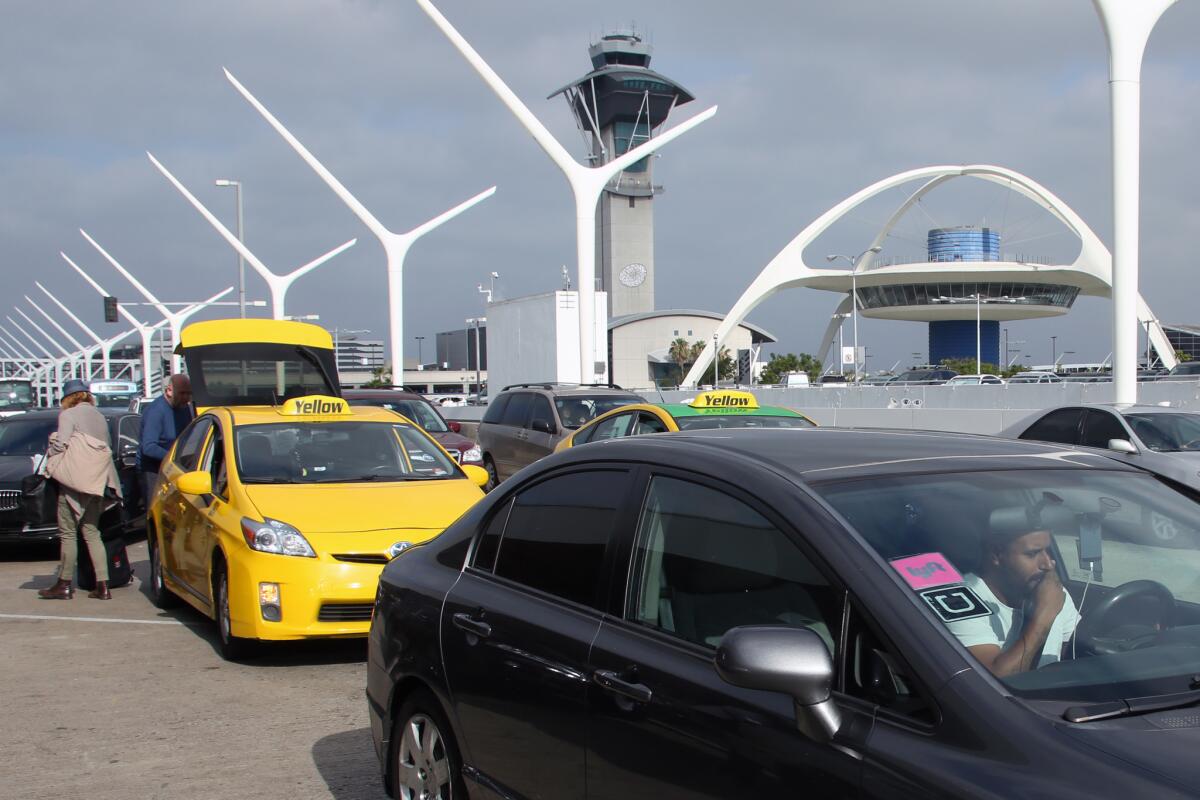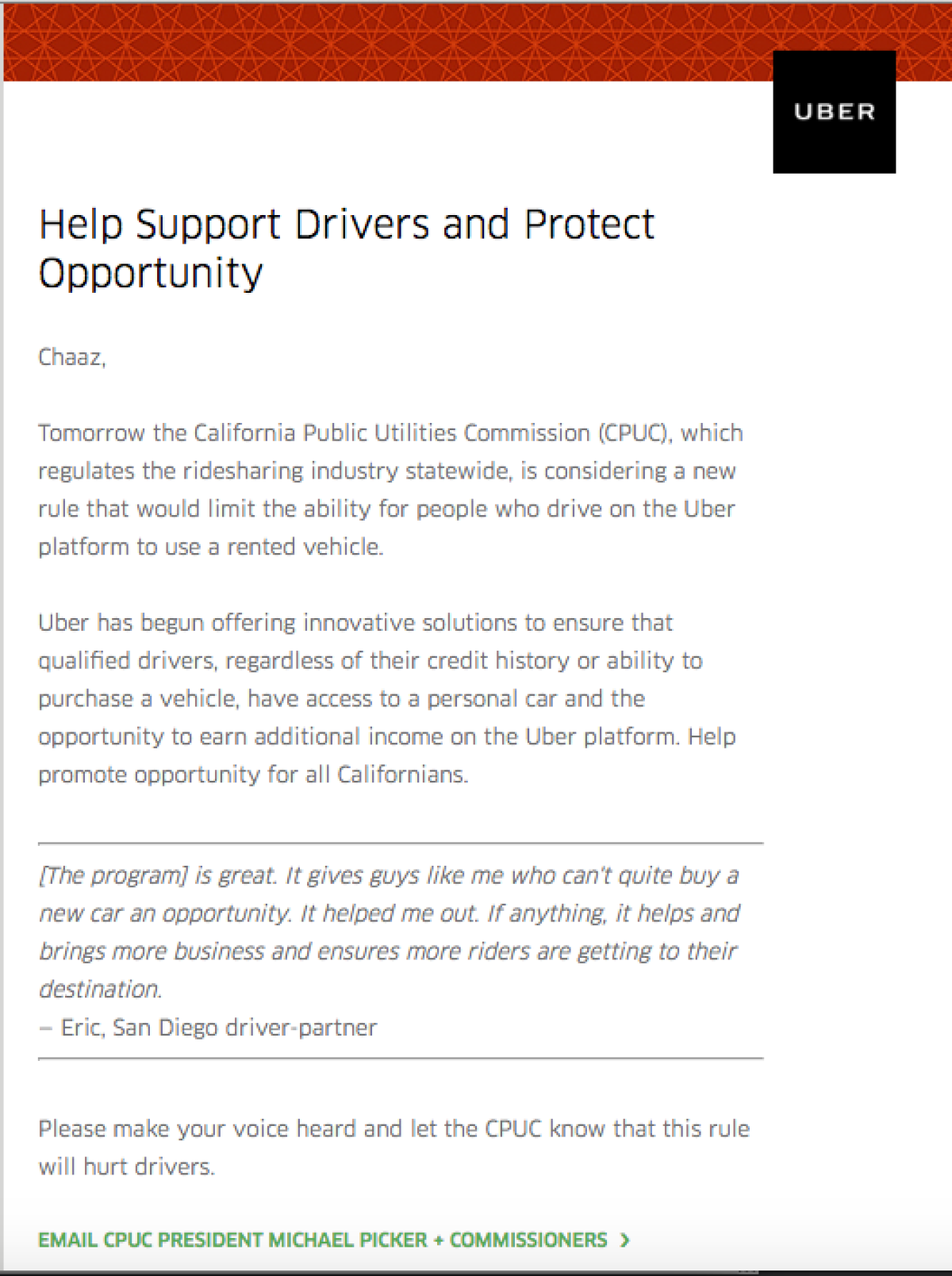Uber and Lyft are winning at the state Capitol — here’s why

Uber and Lyft seem to be conquering California politics.
In just the last month, the ride-hailing giants have secured a string of victories at the Capitol, killing or delaying legislation and regulations they didn't like and shepherding in new rules favorable to the industry.
The companies are also resolving high-profile court cases that challenged how they hire drivers — without hurting their shared core position that drivers aren't their employees. These successes come as Uber and Lyft are dominating the market in California, transporting millions of passengers each month while taxi trips are dropping precipitously.
Here are four reasons why the ride-sharing companies are winning in Sacramento and what their victories might mean for their drivers and customers.
1. The companies have muscle outside — and inside — the Capitol
When something’s about to happen in Sacramento, Uber can marshal a huge response.
In April, more than 100,000 Californians drove for Uber and a whopping 2.3 million people took Uber rides in the state, said the company's director of public affairs, Aaron McLear.
“Counting our drivers, that’s 2.4 million different people who used our technology last month,” McLear said. “That’s a giant shared constituency with these policy makers.”
Uber doesn’t hesitate to use its network.
A day before the California Public Utilities Commission, the agency that regulates the ride-hailing industry, was set to roll out new regulations last month, Uber sent out a note to its drivers and customers with a link to contact CPUC commissioners. The company didn’t like a proposed regulation that would have limited the ability to rent cars to drive them for Uber.

Uber and Lyft have encouraged potential drivers to rent cars to boost their supply of workers, but regulators are concerned that liberal rules would lead to weaker driver training and vehicle inspections. At the hearing, the CPUC decided to punt on the issue and commissioners noted they’d received thousands of emails from Uber supporters.
The companies have ramped up traditional lobbying efforts, too. Three years ago, neither company had lobbyists. Now, they have a gaggle of them.
In the current legislative session, Uber and Lyft have spent nearly $900,000 combined on lobbying. Uber alone reached the top 3% of organizations in lobbyist spending at the Capitol last year. These figures don’t count efforts to support the companies in Sacramento by technology-affiliated organizations such as TechNet and the Internet Assn.
Lawmakers have felt the weight of the ride-hailing industry's influence.
Assemblywoman Lorena Gonzalez (D-San Diego) introduced a major bill this year that would have allowed drivers for Uber and Lyft along with other workers in the so-called gig economy to collectively bargain for their pay and benefits — a major change to how the companies do business.
“I know that these companies don't want to be regulated,” Gonzalez said during an April hearing on the bill. “That they've complained through every single bill through this Legislature that somehow we're impeding the progress of innovation if there are any kind of guidelines.”
Gonzalez has since withdrawn her legislation, saying the issue was too complicated to get through the Capitol this year.
2. Democratic lawmakers like Uber and Lyft
To Assemblyman Mike Gatto (D-Glendale), Uber and Lyft have had as much impact on quality of life as the washing machine and the light bulb.
“With every generation there’s an invention that makes people’s lives easier,” Gatto said.
Gatto, who has authored a bill that would clear the way for ride-hailing drivers to use rented vehicles, is one of a number of Democrats to offer full-throated support for the industry. The majority of Democrats who are vocal in their backing of the companies are young or represent regions with large tech employers.
State Sen. Ben Allen (D-Santa Monica) fits both descriptions. The 38-year-old represents the Silicon Beach area of Los Angeles, home to companies like Snapchat, and said he wants to help tech businesses succeed.
“I think it’s part of my responsibility to be a part of that story,” Allen said.
Last month, Allen played a key role in killing a bill in a Senate committee that would have limited Uber and Lyft’s ability to spike prices during high demand.
Legislative support for the industry is becoming more organized. Last year, bipartisan groups of lawmakers created caucuses to represent the concerns of the tech community and millennials. GOP legislators generally back the ride-hailing industry for economic reasons.
This combination of Democratic friendliness and Republican support is enough to overwhelm opposition to ride-hailing practices from the Democrats’ traditional labor allies. To union advocates, the enthusiasm for Uber and Lyft is misguided because they believe lawmakers are ignoring concerns about worker and consumer protections.
“I think these Democrats better think twice about whether they want a system where there’s 200,000 people driving around California without workers' comp insurance, and which part of government is going to pay for it because Uber’s not,” said Barry Broad, a labor lobbyist with the Teamsters.
3. The state doesn't want to regulate ride-sharing companies — but it doesn't want cities to either
The head of the California Public Utilities Commission has a lot on his plate. His agency is responsible for regulating gas and electric companies in California and has faced intense criticism for its handling of the San Onofre nuclear plant shutdown and Aliso Canyon methane gas leak in recent years. And now CPUC President Michael Picker is telling anyone who will listen that he’d rather not have to deal with ride-sharing companies anymore.
“They aren't something we can do effectively," Picker said of regulating the industry at a March Assembly committee hearing.
The agency has just 22 investigators statewide to enforce regulations for ride-sharing as well as tour buses, limousines, ferries, water taxis and moving companies, all of which are under its jurisdiction.
No one at the Capitol, however, has come up with a viable alternative. In the meantime, the agency has implemented major regulations that the companies favor while delaying those they don’t.
Last month, the utilities commission formally approved Uber and Lyft’s long-desired plans to offer carpooling by allowing customers to split fares as part of a package of new rules.
But it hasn’t resolved more contentious issues such as rental cars and whether to require deeper background checks on ride-hailing drivers. The agency has also rebuffed local government efforts, notably from the cities of Los Angeles and San Francisco, to step in. In late March, the commission denied a request from Los Angeles Mayor Eric Garcetti to allow the city to scan ride-hailing drivers’ fingerprints in background checks, saying it was better to enforce a uniform policy across the state.
The agency expects to decide on rental car and background check regulations by the end of the year.
4. Delayed decisions are good for Uber and Lyft
It’s unlikely Uber and Lyft can keep this streak of victories going forever. The companies face challenges on multiple fronts in the state, including CPUC fines for failing to turn over data and lawsuits alleging inadequate insurance policies. They also continue to face local government pressure.
The big unknown remains the status of the companies’ drivers. Both Uber and Lyft are in the process of settling major lawsuits that attempted to force the companies to turn their drivers from independent contractors into employees. This change could subject drivers to stricter schedules but also give them benefits including a minimum wage and meal breaks. The switch would also increase the companies’ costs by more than 30%, according to one estimate, because the companies would be forced to pay drivers' mileage, payroll taxes and unemployment insurance.
The legal settlements, which still need judicial approval, require the companies to pay millions to their drivers but leave them classified as independent contractors.
California lawmakers, perhaps through a revived version of the Gonzalez bill, regulators or other courts could end up forcing the companies’ hands by declaring drivers employees or otherwise forcing Uber and Lyft to provide drivers greater benefits.
But even delays are de-facto victories for Uber and Lyft. They're continuing to grow their share of the market while cabs are struggling under the strict rules legislators and regulators put on the taxi industry long ago.
Follow @dillonliam on Twitter
ALSO:
Timeline: Uber and Lyft's victories at the state Capitol
Uber and Lyft have devastated L.A.'s taxi industry, city records show
California bill seeking to limit surge pricing by Uber and Lyft dies
Facing regulatory roadblocks, Uber ramps up its lobbying in California
Get the L.A. Times Politics newsletter
Deeply reported insights into legislation, politics and policy from Sacramento, Washington and beyond. In your inbox three times per week.
You may occasionally receive promotional content from the Los Angeles Times.








